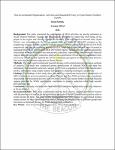| dc.contributor.author | Ocen, Patrick | |
| dc.contributor.author | Acanga, Alfred | |
| dc.date.accessioned | 2023-04-24T10:17:11Z | |
| dc.date.available | 2023-04-24T10:17:11Z | |
| dc.date.issued | 2022 | |
| dc.identifier.citation | Ocen, P., and Acanga, A. (2022). Non-Governmental Organizations’ Activities and Household Poverty in Oyam District-Northern Uganda | en_US |
| dc.identifier.uri | http://ir.lirauni.ac.ug/xmlui/handle/123456789/625 | |
| dc.description.abstract | Background: The study examined the contribution of NGO activities on poverty reduction in Oyam District-Northern Uganda and recommends strategies for improving well being of the people in the region and entirely Uganda as a country. This was based on account that, Oyam District was estimated with the lowest annual GDP per capita of 223 USD compare to the neighboring districts of Apac and Kole with the annual GDP per capita of 228 USD and 230 USD respectively and also the escalating poverty level in Lango Sub-Region where Oyam is located as indicated by UNICEF (2020) and UBOS 2019/2020 reports. Specifically, the study examined the relationship between NGO activities and poverty reduction, explored the contribution of financial support activities on poverty reduction, analysed the contribution of food security support activities on poverty reduction, and explored the role of community perception on the relationship between Ngo activities and poverty reduction in Oyam District. Methods: The study used correlational research designs with correlational and regression methods of analysis. The study was conducted among beneficiaries of selected NGOs and other key informants. The researcher selected a sample of 290 from a population of 860 NGO beneficiaries and key informants using simple random and purposive sampling techniques respectively. Findings: The findings of this study show that there is a significant and positive contribution of NGO activities on poverty reduction in Oyam District and that NGO activities have a moderate relationship with household poverty level in Oyam District. The results further show that financial support provided by NGOs significantly contributes to poverty reduction while food security provided does not. Conclusion: The study concludes that NGO activities contribute significantly to poverty reduction in Oyam District. Recommendations: This study recommends that the food security support provided be backed with the provision of market for the agricultural products of the NGO beneficiaries and in order to create income for them. The study further recommends that NGO support to agricultural product market search for their beneficiaries as well as forming the beneficiaries in different groups and train them on financial literacy for better management of finances. Key Words: Non-Governmental Organizations, Household and Poverty | en_US |
| dc.language.iso | en | en_US |
| dc.publisher | Lira University | en_US |
| dc.subject | Non-Governmental Organizations | en_US |
| dc.subject | Household | en_US |
| dc.subject | Poverty | en_US |
| dc.title | Non-Governmental Organizations’ Activities and Household Poverty in Oyam District-Northern Uganda | en_US |
| dc.type | Thesis | en_US |

